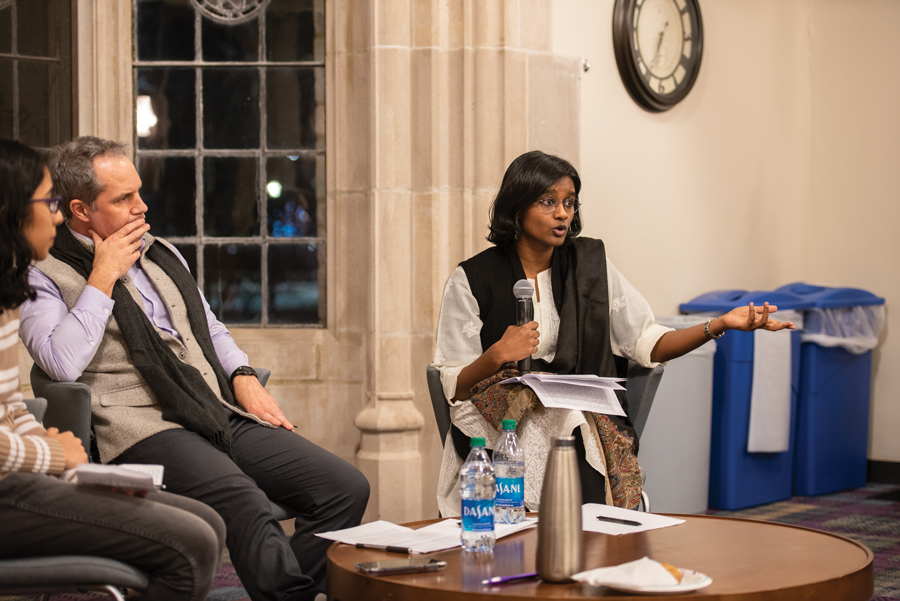South Asian Solidarity NU organizes talk on new discriminatory Indian
Caroline Megerian/ The Daily Northwestern
Raina Bhagat, Tyler Williams and Krithika Ashok discuss the new Indian citizenship law.
January 23, 2020
South Asian Solidarity NU organized a teach-in event at the Graduate Student Commons on Wednesday discussing new citizenship laws in India that are widely-considered anti-Muslim. The group was formed earlier this month in response to the current political climate in India.
Krithika Ashok, professor at Jindal Global Law School and Tyler Williams, a University of Chicago professor, spoke to an audience of about 55 attendees. They discussed the constitutional legality of the new act, as well as the ties between American universities and the Indian government.
The ruling Hindu nationalist party, Bharatiya Janata Party, passed the Citizenship Amendment Act (CAA) in December 2019. It grants citizenship to Hindus, Sikh, Buddhist, Jain, Parsi and Christian minorities from Bangladesh, Afghanistan and Pakistan while excluding Muslim minorities.
The act also resulted in the government creating a National Register of Citizens (NRC), which would arrest and deport current Muslim residents and stirred ongoing nationwide protests in India.
“It’s hard for me to be so far away from home when all these things are happening,” said Shankar Salwan, a graduate student from Delhi who attended the event.
Salwan attended in search of a politically active community he could join. He said other South Asian students at NU should speak out against the act and that the current situation in India should not be “taken lightly.”
Reflecting on the history of citizenship laws and the legality of the present-day amendment, Ashok said “the right to have rights” was important.
“The question of who is an Indian citizen is ultimately a reflection of what is India,” Ashok said. “Which is why many have waged this battle against the CAA in the name of the very soul of the country.”
Ashok said the changes in the law were “unconstitutional and discriminatory” and have little rationale. She voiced concerns that it would be difficult to differentiate people based on religion, and that doing so would not be true to the act’s stated aim of “protecting persecuted religious minorities.”
“The desire to identify, detain, deport undocumented immigrants [not protected by the act] is manifesting itself in the demand for (a) nationwide register of citizens,” Ashok said.
If the proposed registration was carried out in the same way as the on-going efforts, Ashok said it would be “immoral, unconstitutional and inhumane,” putting pressure on marginalized communities.
Williams emphasized the parallels of Indian nationalism and the rise of similar policies and rhetoric in the West. He said the Patriot Act and more recent facial-recognition usage in the United States is an example of such oppressive policies.
He said this type of reasoning resonated in India’s Aadhaar system,a 12-digit identification number issued to Indian citizens and passport-holders that granted them state benefits while tapping into their biometric and demographic data.
Williams also mentioned that institutions of higher education such as Northwestern University and UChicago are often related to such policy changes.
“I am currently teaching in a university that supplies technical expertise, resources and even personnel to the Indian state,” Williams said.
He noted that the heads of certain U.S. universities “regularly meet with and advise” Indian heads of state, and that it is necessary for scholars here to speak out against the “exporting” of such models and policies.
“We want to express not only solidarity with the protestors,” Williams said.”We want more to instrumentally stop those networks of patronage and stop the discursive support that prop up the current regime.”
Raina Bhagat, a member of South Asian Solidarity NU said she was excited by the turnout and prospect of future discussions.
The group is planning on organizing protestors to join a protest under the banner “Coalition to Stop Genocide” in Chicago on Jan. 26th, India’s Republic Day.
“Before you even take a political stance on something, you need to know what these laws are, how they’re affecting people,” she said. “That being our goal, I think we were definitely able to achieve that tonight.”
Email: [email protected]
Twitter: @AnushuyaThapa
Related Stories:
ACIR petition calls for fossil fuel divestment
NU, ETHS students march for DACA before Supreme Court hearing


